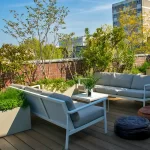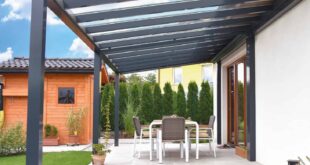A roof garden is a space on the top of a building that is specifically designed to grow plants and create a green oasis high above the city streets. These gardens can vary in size and style, from small rooftop terraces to expansive landscapes with trees, shrubs, and flowers. Roof gardens are gaining popularity in urban areas as a way to utilize otherwise unused space and to combat the heat island effect by providing insulation for buildings.
One of the main benefits of a roof garden is its ability to reduce energy costs for the building. The plants and soil in the garden act as natural insulation, helping to regulate the temperature inside the building. This can lead to lower energy bills for heating and cooling. In addition, the plants help to absorb carbon dioxide and release oxygen, improving air quality in the surrounding area.
Roof gardens also provide a peaceful retreat from the hustle and bustle of city life. They offer a place where people can relax, unwind, and connect with nature in an urban environment. Being surrounded by greenery and flowers can have a calming effect on the mind and body, making roof gardens ideal for both relaxation and social gatherings.
Another advantage of roof gardens is their ability to capture and filter rainwater. This helps to reduce stormwater runoff and can alleviate pressure on local drainage systems. The plants in the garden absorb water through their roots and release it back into the atmosphere through a process called evapotranspiration. This cycle helps to reduce flooding in urban areas and contributes to overall water conservation efforts.
In addition to their environmental benefits, roof gardens also add aesthetic value to a building. They can enhance the visual appeal of the structure, creating a more welcoming and attractive environment for residents and visitors. Roof gardens can be designed in a variety of styles, from formal gardens with neatly trimmed hedges to wildflower meadows bursting with color. The design possibilities are endless, allowing for creativity and personalization in each garden.
Overall, roof gardens offer a multitude of benefits, from energy savings to improved air quality to enhanced aesthetics. As urban areas continue to grow and become more densely populated, roof gardens provide a valuable green space that can help to improve the quality of life for residents. Whether for relaxation, socializing, or environmental conservation, roof gardens are a valuable addition to any building.















